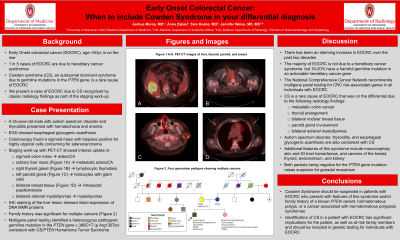Monday Poster Session
Category: Colon
P1687 - Early Onset Colorectal Cancer: When to Include Cowden Syndrome in Your Differential Diagnosis
Monday, October 23, 2023
10:30 AM - 4:15 PM PT
Location: Exhibit Hall

Has Audio

Joshua Morny, MBChB
University of Wisconsin
Madison, WI
Presenting Author(s)
Joshua Morny, MBChB1, Anna Zakas, MS, MPH1, Samuel Koebe, MD1, Jennifer Weiss, MD, MS2
1University of Wisconsin, Madison, WI; 2University of Wisconsin School of Medicine, Madison, WI
Introduction: Early onset colorectal cancer (EOCRC), CRC in individuals < 50 years, is on the rise. One in 5 cases are due to hereditary cancer syndromes. Cowden syndrome (CS), caused by autosomal dominant germline mutations in the PTEN gene, is a rare cause of EOCRC. We present a case of EOCRC due to Cowden syndrome initially recognized by a collection of radiology findings in the staging workup.
Case Description/Methods: A male, age 35 with autism spectrum disorder and thyroiditis, presented with hematochezia after starting anticoagulation for a recent PE. EGD showed esophageal glycogenic acanthosis and colonoscopy found a sigmoid mass with some additional adenomas. The colon mass was necrotic tissue with highly atypical cells concerning for adenocarcinoma. Staging work-up with PET CT showed intense uptake in: 1) sigmoid colon mass, 2) solitary liver mass, 3) massively enlarged right thyroid gland, 4) left parotid gland, 5) bilateral breast tissue, and 6) bilateral adrenal myelolipomas [Figure 1]. Biopsies confirmed metastatic adenocarcinoma in the liver with intact expression of DNA MMR proteins, histiocytes with giant cells in the parotid, and intraductal papillomatosis in breast tissue. Family history was significant for a sister with thyroid cancer at 19, breast ductal papillomas, adenomatous colon polyps in her 30s, and pre-cancerous endometrial cells in her 20s. Multigene panel germline testing identified a heterozygous pathogenic mutation in the PTEN gene c.388C >T (p.Arg130Ter) consistent with CS/PTEN Hamartoma Tumor Syndrome.
Discussion: EOCRC is on the rise. The majority of EOCRC is not due to a hereditary cancer syndrome, but 16-20% have a harmful germline mutation in an actionable hereditary cancer gene. The National Comprehensive Cancer Network recommends multigene panel testing for CRC risk-associated genes in all patients with EOCRC. CS should be in the differential if staging workup shows thyroid enlargement, nodular breast tissue, parotid gland involvement, and adrenal myelolipomas. The history of autism spectrum disorder, thyroiditis, and esophageal glycogenic acanthosis in our patient was also consistent with CS. Additional features of this syndrome include macrocephaly, skin and GI tract hamartomas, and cancers of the breast, thyroid, endometrium, and kidney. Identification of CS has significant implications for the patient, as well as at-risk family members and should be included in genetic testing for individuals with EOCRC.

Disclosures:
Joshua Morny, MBChB1, Anna Zakas, MS, MPH1, Samuel Koebe, MD1, Jennifer Weiss, MD, MS2. P1687 - Early Onset Colorectal Cancer: When to Include Cowden Syndrome in Your Differential Diagnosis, ACG 2023 Annual Scientific Meeting Abstracts. Vancouver, BC, Canada: American College of Gastroenterology.
1University of Wisconsin, Madison, WI; 2University of Wisconsin School of Medicine, Madison, WI
Introduction: Early onset colorectal cancer (EOCRC), CRC in individuals < 50 years, is on the rise. One in 5 cases are due to hereditary cancer syndromes. Cowden syndrome (CS), caused by autosomal dominant germline mutations in the PTEN gene, is a rare cause of EOCRC. We present a case of EOCRC due to Cowden syndrome initially recognized by a collection of radiology findings in the staging workup.
Case Description/Methods: A male, age 35 with autism spectrum disorder and thyroiditis, presented with hematochezia after starting anticoagulation for a recent PE. EGD showed esophageal glycogenic acanthosis and colonoscopy found a sigmoid mass with some additional adenomas. The colon mass was necrotic tissue with highly atypical cells concerning for adenocarcinoma. Staging work-up with PET CT showed intense uptake in: 1) sigmoid colon mass, 2) solitary liver mass, 3) massively enlarged right thyroid gland, 4) left parotid gland, 5) bilateral breast tissue, and 6) bilateral adrenal myelolipomas [Figure 1]. Biopsies confirmed metastatic adenocarcinoma in the liver with intact expression of DNA MMR proteins, histiocytes with giant cells in the parotid, and intraductal papillomatosis in breast tissue. Family history was significant for a sister with thyroid cancer at 19, breast ductal papillomas, adenomatous colon polyps in her 30s, and pre-cancerous endometrial cells in her 20s. Multigene panel germline testing identified a heterozygous pathogenic mutation in the PTEN gene c.388C >T (p.Arg130Ter) consistent with CS/PTEN Hamartoma Tumor Syndrome.
Discussion: EOCRC is on the rise. The majority of EOCRC is not due to a hereditary cancer syndrome, but 16-20% have a harmful germline mutation in an actionable hereditary cancer gene. The National Comprehensive Cancer Network recommends multigene panel testing for CRC risk-associated genes in all patients with EOCRC. CS should be in the differential if staging workup shows thyroid enlargement, nodular breast tissue, parotid gland involvement, and adrenal myelolipomas. The history of autism spectrum disorder, thyroiditis, and esophageal glycogenic acanthosis in our patient was also consistent with CS. Additional features of this syndrome include macrocephaly, skin and GI tract hamartomas, and cancers of the breast, thyroid, endometrium, and kidney. Identification of CS has significant implications for the patient, as well as at-risk family members and should be included in genetic testing for individuals with EOCRC.

Figure: Figure 1. PET CT images showing increased uptake in: A) liver mass, B) thyroid gland, C) parotid gland, and D) breast tissue.
Disclosures:
Joshua Morny indicated no relevant financial relationships.
Anna Zakas indicated no relevant financial relationships.
Samuel Koebe indicated no relevant financial relationships.
Jennifer Weiss: Exact Sciences – Grant/Research Support.
Joshua Morny, MBChB1, Anna Zakas, MS, MPH1, Samuel Koebe, MD1, Jennifer Weiss, MD, MS2. P1687 - Early Onset Colorectal Cancer: When to Include Cowden Syndrome in Your Differential Diagnosis, ACG 2023 Annual Scientific Meeting Abstracts. Vancouver, BC, Canada: American College of Gastroenterology.
